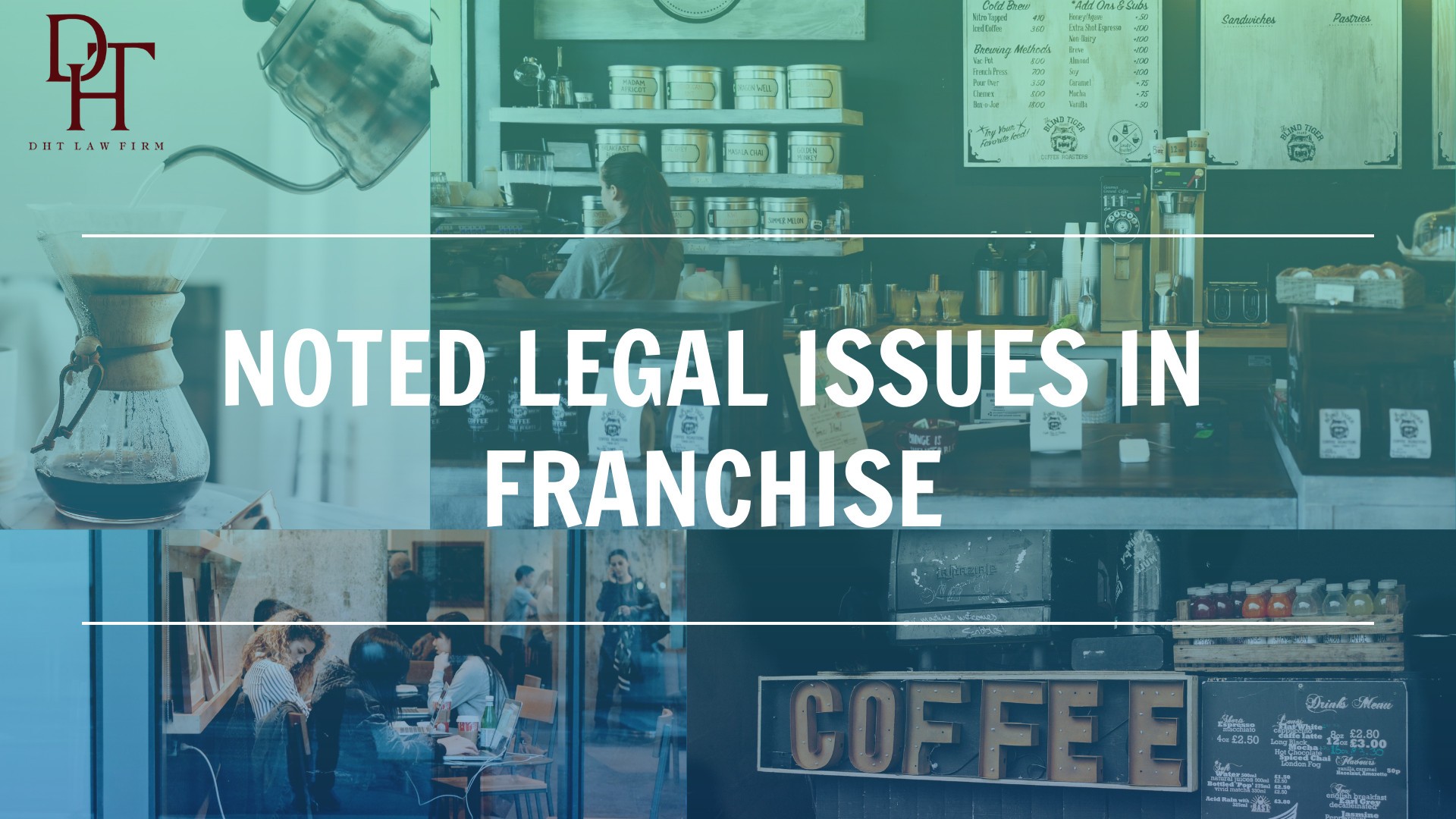
NOTED LEGAL ISSUES IN FRANCHISE

Franchising is not only a catalyst to help boost the Vietnamese economy but also an opportunity for domestic businesses to step out into the international arena. This is one of the popular business methods that businesses today are very interested in because this is a proven path to rapid growth. But it's not easy to succeed, especially in this challenging economy. Therefore, We - Dai Ha Thanh Law Firm will give some legal issues to note along with recommendations/solutions for businesses and investors in the matter of franchising in order to be able to operate the business applied in commercial practice.
1. Franchise overview:
1.1. Definition
From an economic point of view, franchising is considered an activity to expand the business system, along with the distribution/production of goods and services by merchants through division sharing a trade secret with another trader.
From a legal perspective, the Commercial Law 2005 explains that franchising is a commercial activity, whereby the franchisor allows and requires the franchisee to conduct the purchase and sale of goods and provide services according to the law. the conditions specified in Article 284 of this Law.
1.2 Basic characteristics
Regarding the subject, franchising activities always involve the franchisor (franchisor) and the franchisee (franchisee). The franchisor and the franchisee must both be traders and independent legal entities. Thereby, we can see that in terms of subject matter, there is no difference between franchising activities and commercial agency and goods distribution activities.
Regarding the object, the object of a franchise is the commercial rights that the franchisor grants (under a contractual agreement) to the franchisee. Commercial right here is understood as the right to trade in goods and services associated with the franchisor's trademark, trade name, business slogan, business logo, and advertisement in a manner organized by the franchisor. regulatory franchise.
On the uniformity and system: With the requirement to build a unified brand image, the franchisor often sets uniform requirements for each franchisee. In most franchisors, regardless of geographical location, they must be qualified according to a pre-designed model with the franchisor in mind.
Regarding the franchisor's ongoing supervision and support to the franchisee: Accordingly, the franchisor can periodically check the franchisee's exercise of commercial rights to ensure the consistency of the system. franchise system and the stability of the quality of goods and services. In addition, the franchisor is also obliged to provide the necessary support to the franchisee during the franchising process to help the franchisee implement the right business methods and operate effectively.

2. Conditions for enterprises to operate franchising
For franchisors:
- The business system intended to be used for franchising has been in operation for at least 1 year.
This condition applies to Vietnamese traders, before purchasing a trading system, must have experience in the market to gain experience and evaluate the profitability in that field before conducting business activities according to the regulations. franchise contract. This regulation is intended to protect domestic enterprises, ensuring that domestic enterprises must gain certain experience before purchasing a business system.
- Having registered commercial franchising activities with the competent authority as prescribed.
-"Business goods and services subject to commercial rights do not violate the provisions of Article 7 of this Decree 35/2008/ND-CP ".
For foreign-invested enterprises specializing in goods purchase and sale activities and activities directly related to the purchase and sale of goods when they want to conduct commercial franchising activities in Vietnam, in addition to the provisions mentioned above: As stated in Article 7 above, these enterprises are only allowed to carry out franchising activities for goods for which they are allowed to trade in distribution services according to Vietnam's international commitments.
For franchisees:
In case a trader (Vietnamese) who is a franchisee after a period of time wants to transfer the franchise to another party, the law requires the Vietnamese party to also do business by the method of franchising. for at least one year before re-licensing the franchise.
3. Notes on the current way of participating in the franchising market
- Direct franchising: The benefit for the franchisor is being able to establish a close relationship with the franchisee and be able to carry out many tests to ensure a promising future in the new market. However, businesses should note that this method will limit both the speed and scale of the expansion of the franchise system because of the complex nature of negotiating, controlling and providing support to human rights parties. from the country of investment.
- General franchising: This method brings franchisors many benefits, including fast market access, low capital costs and taking advantage of local partners' understanding of the environment. business school of the host country. However, the franchisor will lose the opportunity to have direct access and control over the franchisee's market in the host country, and also face the dangers of limited choice of franchisees. as well as the risk of the brand being negatively affected.
- Subsidiary: In this method, the enterprise can open a facility on its own or sign a franchise contract with the franchisee in the franchisee's country. Because of this subsidiary, the franchisee can effectively control the intellectual property rights, and open testing facilities to test the market. provide training and support to franchisees. However, establishing a subsidiary requires some additional costs and a more binding commitment from the franchisor.
- Branch: The branch method allows the franchisor to test the franchise system, train and provide support to the franchisee. Establishing a branch requires initial financing and is less expensive to manage than setting up a subsidiary. However, the branch is not an independent legal entity and the franchisor must assume the legal responsibilities of its branch in the franchisee's country. Usually, the choice of establishing a subsidiary or branch of a franchisor depends on tax regulations.

A franchise contract must achieve two basic purposes:
First, the terms of the contract must be complete, clear and precise to bind the parties. by contractual relationship and able to solve problems arising in the course of contract performance;
Second, protect the interests of the parties and especially the intellectual property rights of the franchisor. The franchisor also needs to know that, according to Vietnamese law, if there is an unclear point in the franchise contract, the court tends to interpret that point in favor of the franchisee with the main reason the licensor is the drafter of the contract
“In case the strong party introduces into the contract the content that is unfavorable to the disadvantaged party, the contract must be interpreted in favor of the disadvantaged party” (Clause 8), Article 409 of the Civil Code)
Next, Article 11 of Decree 35 emphasizes on the content that needs attention of the franchise contract: “In case the parties choose to apply Vietnamese law, the franchise contract will A commercial right may have the following principal contents…”. This proves that Vietnamese law does not impose regulations on mandatory content in a franchise contract, but depending on each specific contract, the parties can freely agree on terms that both agree. However, for a franchise contract with foreign elements, the issue of dispute resolution agency and the law applicable to the contract is one of the issues that the parties need to pay attention to when entering into the contract. copper. Therefore, the parties can completely agree to choose the legal system to regulate their franchising activities. In case the contract does not contain a provision on applicable law, the consideration of applicable law to govern the content of an international franchise contract will be applied as for a general contract under Article 683 of the Civil Code 2015.
5. Some risks in franchising activities
Although franchising brings many advantages, there are also many risks in franchising.

6. Recommendations for solutions
Particularly for the franchisor, it is necessary to carefully develop instructions for the franchisor; develop preventive measures to prevent "stealing", copying the franchisor's secret of business.
For both franchisors and franchisees, when participating in franchising, it is necessary to learn carefully about the legal regulations governing franchising activities to comply with the provisions of the law, protect their legitimate rights and interests in accordance with the law.
In addition, each party also needs to learn more about the partner to avoid taking advantage of and entering the franchise system for unscrupulous and honest purposes.
In the franchising contract relationship, the two parties also need to negotiate and agree carefully on the terms of the contract to ensure the legitimate rights and interests of the two parties, balance the interests of the partner, and move towards a legal relationship long-term cooperation; At the same time, it also limits risks, prevents legal disputes and unfortunately, if there is a dispute, there is also a basis for dispute resolution.
6. Conclusion:
Above is the entire overview of Dai Ha Thanh Law Firm on legal issues related to franchising in Vietnam. From there, we offer solution recommendations for practical risks that investors/businesses can note and apply when they want to participate in franchising. Dai Ha Thanh Law Firm with a team of professionally trained lawyers and legal advisors is committed to providing professional legal services to customers. If you need detailed advice, please contact us for professional and effective legal advice.

